2021-2022学年外研版英语八年级上册 Revision Module 1 How to learn English 课件(共32张PPT)
文档属性
| 名称 | 2021-2022学年外研版英语八年级上册 Revision Module 1 How to learn English 课件(共32张PPT) | 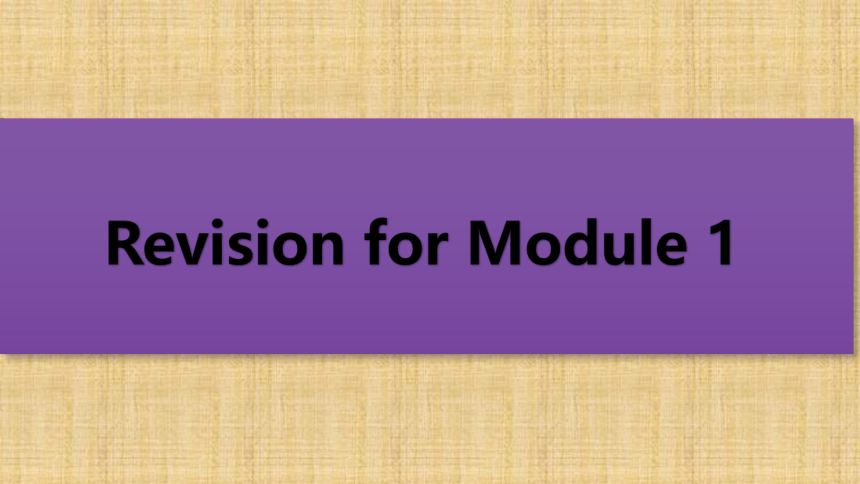 | |
| 格式 | zip | ||
| 文件大小 | 393.8KB | ||
| 资源类型 | 教案 | ||
| 版本资源 | 外研版 | ||
| 科目 | 英语 | ||
| 更新时间 | 2021-10-01 09:54:43 | ||
图片预览

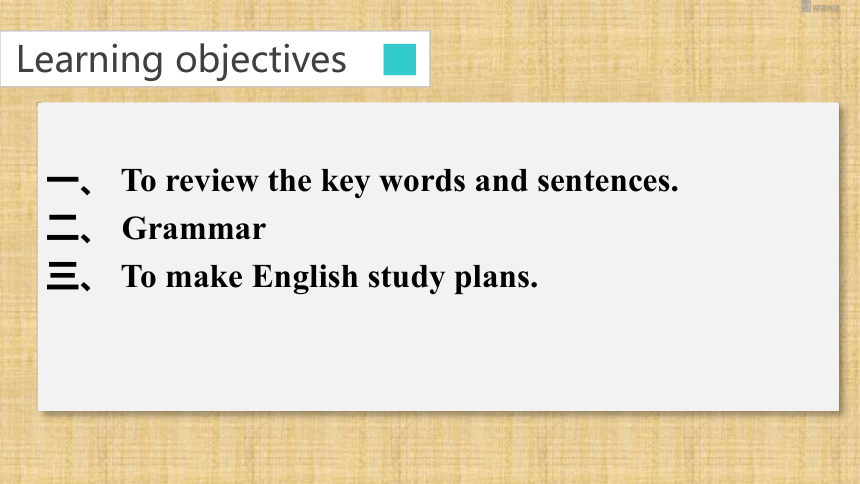
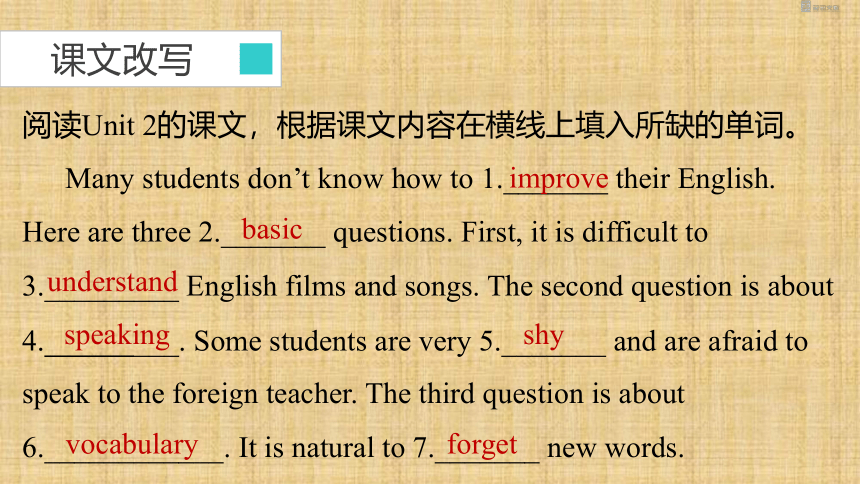


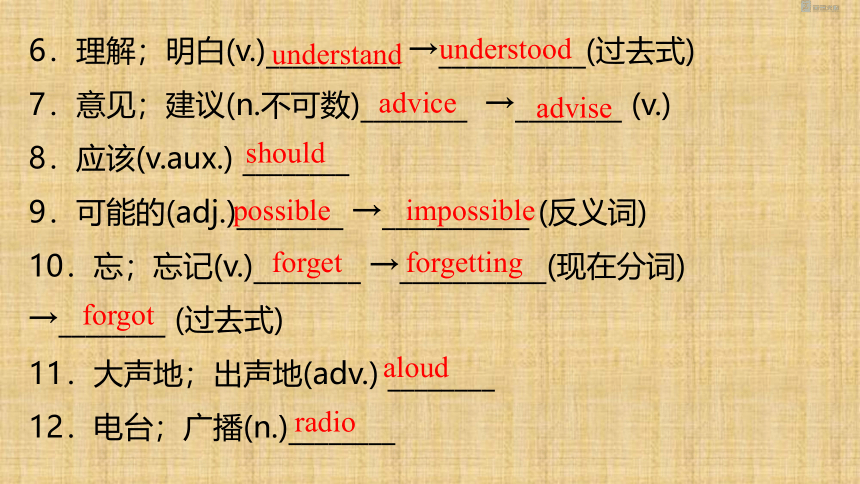



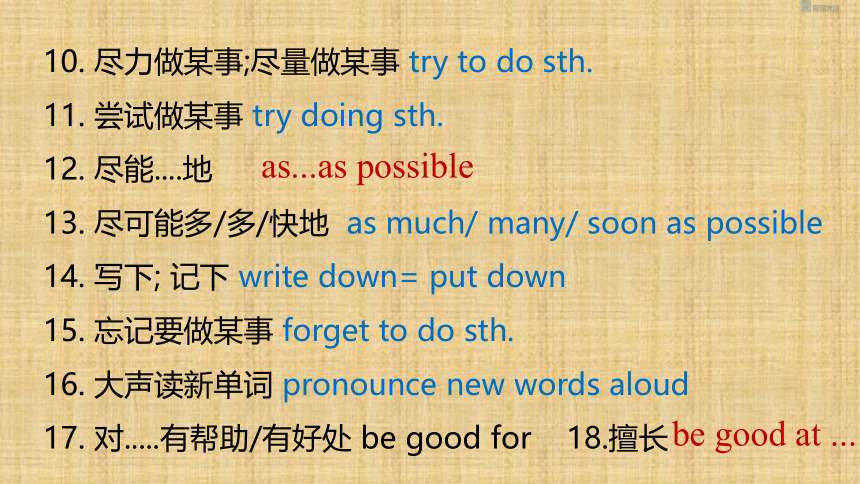
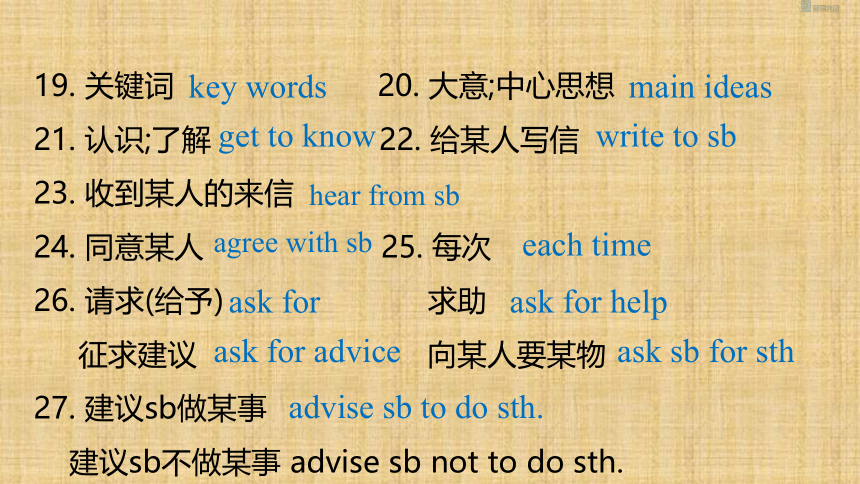

文档简介
(共32张PPT)
Revision
for
Module
1
Learning
objectives
一、
To
review
the
key
words
and
sentences.
二、
Grammar
三、
To
make
English
study
plans.
课文改写
阅读Unit
2的课文,根据课文内容在横线上填入所缺的单词。
Many
students
don’t
know
how
to
1._______
their
English.
Here
are
three
2._______
questions.
First,
it
is
difficult
to
3._________
English
films
and
songs.
The
second
question
is
about
4. ___.
Some
students
are
very
5._______
and
are
afraid
to
speak
to
the
foreign
teacher.
The
third
question
is
about
6.____________.
It
is
natural
to
7._______
new
words.
improve
basic
understand
speaking
shy
vocabulary
forget
Doctor
Diana
gives
us
some
advice.
First,
we
can
8.
the
meaning
of
the
new
words
when
we
watch
English
films
or
listen
to
songs.
Second,
if
we
want
to
start
a
9. ,
we
can
say,
“Hello!
How
are
you ”
Third,
it
is
also
a
good
idea
to
write
down
four
or
five
words
a
day
on
10.
of
paper
and
place
them
in
our
room.
Read
the
words
when
we
see
them,
and
try
to
use
them.
guess
conversation
pieces
Revision
Part
1【
words
、expressions
&
sentences】
根据汉语提示,写出下列单词及变形
1.改正;纠正(v.)
&正确的;对的(adj.)________
→________
(形容词的同义词)→__________
(形容词的反义词)
2.拼写(n.)________
→________
(v.)
3.练习(v.)________
→________
(n.)
4.意义;意思(n.)________
→________
(v.)
5.词典;字典(n.)________
→__________
(复数)
correct
right
false/wrong
spelling
spell
practise
practice
meaning
mean
dictionary
dictionaries
6.理解;明白(v.)__________
→___________(过去式)
7.意见;建议(n.不可数)________
→________
(v.)
8.应该(v.aux.)
________
9.可能的(adj.)________
→___________
(反义词)
10.忘;忘记(v.)________
→___________(现在分词)
→________
(过去式)
11.大声地;出声地(adv.)
________
12.电台;广播(n.)________
understand
understood
advice
advise
should
possible
impossible
forget
forgetting
forgot
aloud
radio
13.赞同(v.)________
→________(第三人称单数)
→________(过去式)
14.词汇;词汇量(n.)__________
→____________(复数)
15.快地;迅速地(adv.)________
→________(adj.)
16.合理的;合乎常情的(adj.)________
→________
(adv.)→________
(n.)
agree
agrees
agreed
vocabulary
vocabularies
quickly
quick
natural
naturally
nature
17.发音(n.)_____________
→____________
(v.)
18.主要的;最大的(adj.)
________
→
________(adv.)
19.建议;提议(v.)
________→___________(n.可数)
20.羞怯的;腼腆的(adj.)
________
→________(n.)
pronunciation
pronounce
main
mainly
suggest
suggestion
shy
shyness
1.
成对的;成双的
2.
练习做某事
3.
将A与B相匹配
4.
用B将A补充完整
5.
查;查找
look
up
6.
寻找look
for
7.
盼望做某事
look
forward
to
doing
sth.
8.
犯错误
9.
在某方面犯错
in
pairs
practise
doing
sth
match
A
with
B
make
a
mistake
/
make
mistakes
make
a
mistake
/
make
mistakes
in
...
complete
A
with
B
Revision
Part
1【
words
、expressions
&
sentences】
10.
尽力做某事;尽量做某事
try
to
do
sth.
11.
尝试做某事
try
doing
sth.
12.
尽能....地
13.
尽可能多/多/快地
as
much/
many/
soon
as
possible
14.
写下;
记下
write
down=
put
down
15.
忘记要做某事
forget
to
do
sth.
16.
大声读新单词
pronounce
new
words
aloud
17.
对.....有帮助/有好处
be
good
for
18.擅长
as...as
possible
be
good
at
...
19.
关键词
20.
大意;中心思想
21.
认识;了解
22.
给某人写信
23.
收到某人的来信
24.
同意某人
25.
每次
26.
请求(给予)
求助
征求建议
向某人要某物
27.
建议sb做某事
建议sb不做某事
advise
sb
not
to
do
sth.
key
words
main
ideas
get
to
know
write
to
sb
hear
from
sb
agree
with
sb
each
time
ask
for
ask
for
help
ask
for
advice
ask
sb
for
sth
advise
sb
to
do
sth.
28.
害怕/不敢做某事
be
afraid
to
do
sth.
害怕做某事;担心会发生某事be
afraid
of
doing
sth.
害怕某人或某物
be
afraid
of
sb./sth.
29.
开始对话
start
a
conversation
30.
对某人微笑
嘲笑某人
laugh
at
sb
31.
在几张纸上
on
pieces
of
paper
smile
at
sb.
Revision
Part
1【
words
、expressions
&
sentences】
【提建议】
1.Why
not
do
...
“为什么不做...呢?”2.Why
don’t
you
/we
do...
“你们/我们为什么不做...呢?”3.Let
sb
do
....
“让某人做.......”4.sb
should
do
...
“某人应该做.......”5.How
about
/
What
about
doing
sth
“做......怎么样?”6.sb
suggest
+
从句.
“某人建议某人做.......”7.advise
sb
to
do
sth
.
“建议某人做.......”8.It's
a
good/great
idea
to
do
sth
.
“做.......是个好主意”9.Shall
we
do...
“让我们做......,怎么样?”10.Would
sb
like
to
do
sth
“某人想要做某事吗?”
Revision
Part
1【
words
、expressions
&
sentences】
【It
作形式主语用法】
“It
is
+
名词(短语)+to
do
sth”句式,it
作形式主语、动词不定式短语是句子的真正主语。
“It
is
+
形容词(for
sb)+to
do
sth”句式,it
作形式主语、动词不定式短语是句子的真正主语。Tips
:
It
is+adj.
+for/
of
sb.to
do
sth.
意为“对某人来说/某人做某事是......的”
It为形式主语,真正的主语为动词不定式短语。
It+be+形容词+for
sb.
+to
do
sth.
形容词是用来描述事物或客观情况的词,如
easy,hard,
difficult,
important,necessary,impossible等。
It+be+形容词+of
sb.
+to
do
sth
形容词是用来描述或说明人的性格、品行等的词,如
good,kind,nice,clever等。
Revision
Part
1【
words
、expressions
&
sentences】
【How/What
about
用法】
“How
about
... ”相当于“What
about
... ”意为“...怎么样?”,常用来提问建议或征求意见。about是介词,后跟名词,代词或动名词形式。
Revision
Part
1【
words
、expressions
&
sentences】
【How/What
about
用法】
“How
about
... ”相当于“What
about
... ”意为“...怎么样?”,常用来提问建议或征求意见。about是介词,后跟名词,代词或动名词形式。
【情态动词should\shall
用法】
Should/shouldn’t
+
动词原形“不应该....”
Shall
多用于第一人称,即shall
I/we
+
动词原形,“我们...好吗?”
Revision
Part
1【
words
、expressions
&
sentences】
根据汉语意思完成句子
1.让我们设法尽可能多地说英语吧。
Let's
try
to
speak
English
____
________
________
________.
2.为什么不把我们的错误记在笔记本上呢?
________
________
________
down
our
mistakes
in
our
notebooks
Why
not
write
as
much
as
possible
3.听广播怎么样?
__________
________
________
to
the
radio
4.不要忘记把正确答案写在所犯错误的旁边。
________
________
________
________
down
the
correct
answers
next
to
the
mistakes.
5.每天大声拼读生词是一个好主意。
It's
a
good
idea
________
________
and
pronounce
new
words
________
every
day.
How/What
about
listening
Don't
forget
to
write
to
spell
aloud
6.许多学生询求关于怎样提高他们英语(水平)的建议。
Many
students________
________
advice
about
how________
________
their
English.
7.看电影和听歌曲是学习英语的好方法!
Watching
films
and
________
to
songs
________
great
ways
to
learn
English!
8.忘记生词是很正常的!
It
is
natural
________
________
new
words!
ask
for
to
improve
listening
are
to
forget
9.我还建议你和朋友们谈谈(所看的)电影或(所听的)歌曲。
I
also
advise
you
________
________
________
the
films
or
songs
with
your
friends.
10.每一次你都会学到新东西。
Each
________
you
will
learn___________
________.
to
talk
about
time
something
new
Revision
Part
2【
Grammar】
一般现在时
用法
①
表现在经常性、习惯性的动作或存在的状态;
②
表客观事实或现在的状况和特征;
③
还用于时间状语从句和条件状语从句中,代替一般将来时。
构成
主语+be动词(am,
is,
are
)
+其他.
I
am
good.
主语+V原/三单+其他.
I
usually
go
to
school
at
7:00.
时间状语
always
,
often
,
sometimes
,
seldom,
every
day
(week,
month,
year,
etc.)
once
a
week,
twice
a
week,
now
and
then,
from
time
to
time等
一般过去时
用法
①
表过去发生的事或存在的状态;
②
表过去经常、反复发生的动作时间状语.
构成
主语+be动词(was,were)+其他.
主语+动词的过去式+其他.
He
was
a
student.
He
visited
his
grandma
last
Sunday.
时间状语
yesterday,
last
night
(week,
year,
month,
Sunday,
etc.
)
then,
at
that
time,
at
that
moment,
a
few
days(weeks,
months,
years,
etc.
)
ago,
由after,
before
,when
,
while引导的表示过去时间的状语从句等
一般将来时
用法
①
表示将来的动作或状况;
②
表示未来习惯性的动作;
③
有些动词用现在进行时表示将要发生的动作,表示按计划或安排即将发生的事这类动词有:come
,go
,
leave
,
start,
arrive,
meet,
fly,
do等
构成
(1)主语+will+动词原形+其他.(2)主语+
be
going
to+动词原形+其他
She
will
do
her
homework
in
two
minutes.
She
is
going
to
do
her
homework.
时间状语
tomorrow
,next
week(
month
,
year
),in
a
few
days(
months
,
years
)
,
soon
,in
the
future等
现在进行时
用法
①表
正在进行的动作
now
,
at
the
moment,
at
present等
②
表
现阶段正在进行的动作。
today
,
this
week,
this
month
,
this
year,this
term...
构成
主语+
am/is/
are+动词的现在分词+其他.
She
is
doing
her
homework
now.
用括号内所给单词的适当形式填空。1.
He
(go)
swimming
in
the
river
every
day
in
summer.2.
Just
a
minute
!
My
brother
(
wash)
his
car
in
the
garden.3.It
is
very
cold.
I
think
it
(
rain).4.-
I
need
some
paper.
-I
(
buy)
some
for
you
later.5.
I
can't
find
my
pen.
Who
(
take)
it 6.
We
should
(
correct)
the
spelling
mistakes.7.
Let's
try
to
(
understand)
the
main
idea
of
the
passage.8.
It's
a
good
idea
(
have)
a
conversation
with
the
teacher.9.
How
about
(
write
)
them
down 10.
Why
not
(watch)
and
(
listen)
several
times 11.
(have)
a
pen
friend
is
a
great
way
to
learn
English.12.
You
don't
need
(
understand)
every
word.
goes
is
washing
will
rain
will
buy
took
correct
understand
to
have
writing
watch
listen
Having
to
understand
Revision
Part
3【
Writing】
本模块围绕”
Making
your
English
study
plan”这一话题展开教学活动。通过本模块的学习,学生不仅可以掌握如何提出建议的句型,还能学到很多学习英语的方法,以及如何制订新的英语学习计划,从而提高自主学习英语的能力。
Revision
Part
3【
Writing】
【写作技巧】(
1
)本模块的话题是"Making
your
English
study
plan”,因此要紧紧围绕这一中心话题征求建议及提出建议,表达要全面、详实,尽量用课文中学过的较为规范的词语和句型。(
2
)从涉及的内容来看,无论是提出自己的建议还是向别人征求意见,都需要逐一列举,从而使全文流畅、生动,条理清楚。(
3)常用短语:
give
sb.
some
advice,
as...as
possible,
write
down,
look
up...(4)常用句型:
Why
not
do...
/
We
should...
/How
about
doing
sth.
/It's+adj.+
for
sb.+
to
do
sth.
Revision
Part
3【
Writing】
【写作应用】
假如你是你们班英语成绩最优秀的学生,受老师和同学们的邀请,你将做一个题为"How
to
learn
English
well"的演讲,请根据下面的提示写一篇70词左右的短文来介绍你学英语的方法。(内容可适当发挥)
提示:(1)每天花费一些时间学英语。
(2)尽可能多地记英语单词并在日常生活中使用它们。
(3)经常读英语书、杂志或报纸。
(4)听或唱英文歌曲。
Revision
Part
3【
Writing】
【写作模板】
开头:打招呼并引出下文
Hello,
everyone.
I'm
very
glad
to
share
my
ideas
on
how
to
learn
English
well
with
you.
中间:详细讲述自己的学习方法:
I
think
we
should...
It's
important
for...
We
should...
When
we
are
free,
why
not..
Listening
to...
结尾:表达祝愿及感谢
I
hope
my
advice
can
be
helpful
in
your
English
learning.
That's
all.
Thank
you
for...
Revision
Part
3【
Writing】
【范文】
How
to
learn
English
well
Hello,
everyone.
I'm
very
glad
to
share
my
ideas
on
how
to
learn
English
well
with
you.
I
think
we
should
spend
some
time
learning
English
every
day.
It's
important
for
us
to
remember
as
many
English
words
as
possible.
We
should
try
to
use
English
words
in
our
daily
life.
When
we
are
free,
why
not
read
some
Englishbooks,
magazines
or
newspapers
Listening
to
or
singing
English
songs
can
make
you
more
interested
in
English
learning.
I
hope
my
advice
can
be
helpful
in
your
English
learning.
That's
all.
Thank
you
for
your
listening
to
me.
Thanks.
Homework:
1.Read
the
words
&
expressions
of
Module
1
2.Review
and
recite
the
words
&
expressions
of
Module
1
3.
Finish
the
Practice
in
the
materials.
Revision
for
Module
1
Learning
objectives
一、
To
review
the
key
words
and
sentences.
二、
Grammar
三、
To
make
English
study
plans.
课文改写
阅读Unit
2的课文,根据课文内容在横线上填入所缺的单词。
Many
students
don’t
know
how
to
1._______
their
English.
Here
are
three
2._______
questions.
First,
it
is
difficult
to
3._________
English
films
and
songs.
The
second
question
is
about
4. ___.
Some
students
are
very
5._______
and
are
afraid
to
speak
to
the
foreign
teacher.
The
third
question
is
about
6.____________.
It
is
natural
to
7._______
new
words.
improve
basic
understand
speaking
shy
vocabulary
forget
Doctor
Diana
gives
us
some
advice.
First,
we
can
8.
the
meaning
of
the
new
words
when
we
watch
English
films
or
listen
to
songs.
Second,
if
we
want
to
start
a
9. ,
we
can
say,
“Hello!
How
are
you ”
Third,
it
is
also
a
good
idea
to
write
down
four
or
five
words
a
day
on
10.
of
paper
and
place
them
in
our
room.
Read
the
words
when
we
see
them,
and
try
to
use
them.
guess
conversation
pieces
Revision
Part
1【
words
、expressions
&
sentences】
根据汉语提示,写出下列单词及变形
1.改正;纠正(v.)
&正确的;对的(adj.)________
→________
(形容词的同义词)→__________
(形容词的反义词)
2.拼写(n.)________
→________
(v.)
3.练习(v.)________
→________
(n.)
4.意义;意思(n.)________
→________
(v.)
5.词典;字典(n.)________
→__________
(复数)
correct
right
false/wrong
spelling
spell
practise
practice
meaning
mean
dictionary
dictionaries
6.理解;明白(v.)__________
→___________(过去式)
7.意见;建议(n.不可数)________
→________
(v.)
8.应该(v.aux.)
________
9.可能的(adj.)________
→___________
(反义词)
10.忘;忘记(v.)________
→___________(现在分词)
→________
(过去式)
11.大声地;出声地(adv.)
________
12.电台;广播(n.)________
understand
understood
advice
advise
should
possible
impossible
forget
forgetting
forgot
aloud
radio
13.赞同(v.)________
→________(第三人称单数)
→________(过去式)
14.词汇;词汇量(n.)__________
→____________(复数)
15.快地;迅速地(adv.)________
→________(adj.)
16.合理的;合乎常情的(adj.)________
→________
(adv.)→________
(n.)
agree
agrees
agreed
vocabulary
vocabularies
quickly
quick
natural
naturally
nature
17.发音(n.)_____________
→____________
(v.)
18.主要的;最大的(adj.)
________
→
________(adv.)
19.建议;提议(v.)
________→___________(n.可数)
20.羞怯的;腼腆的(adj.)
________
→________(n.)
pronunciation
pronounce
main
mainly
suggest
suggestion
shy
shyness
1.
成对的;成双的
2.
练习做某事
3.
将A与B相匹配
4.
用B将A补充完整
5.
查;查找
look
up
6.
寻找look
for
7.
盼望做某事
look
forward
to
doing
sth.
8.
犯错误
9.
在某方面犯错
in
pairs
practise
doing
sth
match
A
with
B
make
a
mistake
/
make
mistakes
make
a
mistake
/
make
mistakes
in
...
complete
A
with
B
Revision
Part
1【
words
、expressions
&
sentences】
10.
尽力做某事;尽量做某事
try
to
do
sth.
11.
尝试做某事
try
doing
sth.
12.
尽能....地
13.
尽可能多/多/快地
as
much/
many/
soon
as
possible
14.
写下;
记下
write
down=
put
down
15.
忘记要做某事
forget
to
do
sth.
16.
大声读新单词
pronounce
new
words
aloud
17.
对.....有帮助/有好处
be
good
for
18.擅长
as...as
possible
be
good
at
...
19.
关键词
20.
大意;中心思想
21.
认识;了解
22.
给某人写信
23.
收到某人的来信
24.
同意某人
25.
每次
26.
请求(给予)
求助
征求建议
向某人要某物
27.
建议sb做某事
建议sb不做某事
advise
sb
not
to
do
sth.
key
words
main
ideas
get
to
know
write
to
sb
hear
from
sb
agree
with
sb
each
time
ask
for
ask
for
help
ask
for
advice
ask
sb
for
sth
advise
sb
to
do
sth.
28.
害怕/不敢做某事
be
afraid
to
do
sth.
害怕做某事;担心会发生某事be
afraid
of
doing
sth.
害怕某人或某物
be
afraid
of
sb./sth.
29.
开始对话
start
a
conversation
30.
对某人微笑
嘲笑某人
laugh
at
sb
31.
在几张纸上
on
pieces
of
paper
smile
at
sb.
Revision
Part
1【
words
、expressions
&
sentences】
【提建议】
1.Why
not
do
...
“为什么不做...呢?”2.Why
don’t
you
/we
do...
“你们/我们为什么不做...呢?”3.Let
sb
do
....
“让某人做.......”4.sb
should
do
...
“某人应该做.......”5.How
about
/
What
about
doing
sth
“做......怎么样?”6.sb
suggest
+
从句.
“某人建议某人做.......”7.advise
sb
to
do
sth
.
“建议某人做.......”8.It's
a
good/great
idea
to
do
sth
.
“做.......是个好主意”9.Shall
we
do...
“让我们做......,怎么样?”10.Would
sb
like
to
do
sth
“某人想要做某事吗?”
Revision
Part
1【
words
、expressions
&
sentences】
【It
作形式主语用法】
“It
is
+
名词(短语)+to
do
sth”句式,it
作形式主语、动词不定式短语是句子的真正主语。
“It
is
+
形容词(for
sb)+to
do
sth”句式,it
作形式主语、动词不定式短语是句子的真正主语。Tips
:
It
is+adj.
+for/
of
sb.to
do
sth.
意为“对某人来说/某人做某事是......的”
It为形式主语,真正的主语为动词不定式短语。
It+be+形容词+for
sb.
+to
do
sth.
形容词是用来描述事物或客观情况的词,如
easy,hard,
difficult,
important,necessary,impossible等。
It+be+形容词+of
sb.
+to
do
sth
形容词是用来描述或说明人的性格、品行等的词,如
good,kind,nice,clever等。
Revision
Part
1【
words
、expressions
&
sentences】
【How/What
about
用法】
“How
about
... ”相当于“What
about
... ”意为“...怎么样?”,常用来提问建议或征求意见。about是介词,后跟名词,代词或动名词形式。
Revision
Part
1【
words
、expressions
&
sentences】
【How/What
about
用法】
“How
about
... ”相当于“What
about
... ”意为“...怎么样?”,常用来提问建议或征求意见。about是介词,后跟名词,代词或动名词形式。
【情态动词should\shall
用法】
Should/shouldn’t
+
动词原形“不应该....”
Shall
多用于第一人称,即shall
I/we
+
动词原形,“我们...好吗?”
Revision
Part
1【
words
、expressions
&
sentences】
根据汉语意思完成句子
1.让我们设法尽可能多地说英语吧。
Let's
try
to
speak
English
____
________
________
________.
2.为什么不把我们的错误记在笔记本上呢?
________
________
________
down
our
mistakes
in
our
notebooks
Why
not
write
as
much
as
possible
3.听广播怎么样?
__________
________
________
to
the
radio
4.不要忘记把正确答案写在所犯错误的旁边。
________
________
________
________
down
the
correct
answers
next
to
the
mistakes.
5.每天大声拼读生词是一个好主意。
It's
a
good
idea
________
________
and
pronounce
new
words
________
every
day.
How/What
about
listening
Don't
forget
to
write
to
spell
aloud
6.许多学生询求关于怎样提高他们英语(水平)的建议。
Many
students________
________
advice
about
how________
________
their
English.
7.看电影和听歌曲是学习英语的好方法!
Watching
films
and
________
to
songs
________
great
ways
to
learn
English!
8.忘记生词是很正常的!
It
is
natural
________
________
new
words!
ask
for
to
improve
listening
are
to
forget
9.我还建议你和朋友们谈谈(所看的)电影或(所听的)歌曲。
I
also
advise
you
________
________
________
the
films
or
songs
with
your
friends.
10.每一次你都会学到新东西。
Each
________
you
will
learn___________
________.
to
talk
about
time
something
new
Revision
Part
2【
Grammar】
一般现在时
用法
①
表现在经常性、习惯性的动作或存在的状态;
②
表客观事实或现在的状况和特征;
③
还用于时间状语从句和条件状语从句中,代替一般将来时。
构成
主语+be动词(am,
is,
are
)
+其他.
I
am
good.
主语+V原/三单+其他.
I
usually
go
to
school
at
7:00.
时间状语
always
,
often
,
sometimes
,
seldom,
every
day
(week,
month,
year,
etc.)
once
a
week,
twice
a
week,
now
and
then,
from
time
to
time等
一般过去时
用法
①
表过去发生的事或存在的状态;
②
表过去经常、反复发生的动作时间状语.
构成
主语+be动词(was,were)+其他.
主语+动词的过去式+其他.
He
was
a
student.
He
visited
his
grandma
last
Sunday.
时间状语
yesterday,
last
night
(week,
year,
month,
Sunday,
etc.
)
then,
at
that
time,
at
that
moment,
a
few
days(weeks,
months,
years,
etc.
)
ago,
由after,
before
,when
,
while引导的表示过去时间的状语从句等
一般将来时
用法
①
表示将来的动作或状况;
②
表示未来习惯性的动作;
③
有些动词用现在进行时表示将要发生的动作,表示按计划或安排即将发生的事这类动词有:come
,go
,
leave
,
start,
arrive,
meet,
fly,
do等
构成
(1)主语+will+动词原形+其他.(2)主语+
be
going
to+动词原形+其他
She
will
do
her
homework
in
two
minutes.
She
is
going
to
do
her
homework.
时间状语
tomorrow
,next
week(
month
,
year
),in
a
few
days(
months
,
years
)
,
soon
,in
the
future等
现在进行时
用法
①表
正在进行的动作
now
,
at
the
moment,
at
present等
②
表
现阶段正在进行的动作。
today
,
this
week,
this
month
,
this
year,this
term...
构成
主语+
am/is/
are+动词的现在分词+其他.
She
is
doing
her
homework
now.
用括号内所给单词的适当形式填空。1.
He
(go)
swimming
in
the
river
every
day
in
summer.2.
Just
a
minute
!
My
brother
(
wash)
his
car
in
the
garden.3.It
is
very
cold.
I
think
it
(
rain).4.-
I
need
some
paper.
-I
(
buy)
some
for
you
later.5.
I
can't
find
my
pen.
Who
(
take)
it 6.
We
should
(
correct)
the
spelling
mistakes.7.
Let's
try
to
(
understand)
the
main
idea
of
the
passage.8.
It's
a
good
idea
(
have)
a
conversation
with
the
teacher.9.
How
about
(
write
)
them
down 10.
Why
not
(watch)
and
(
listen)
several
times 11.
(have)
a
pen
friend
is
a
great
way
to
learn
English.12.
You
don't
need
(
understand)
every
word.
goes
is
washing
will
rain
will
buy
took
correct
understand
to
have
writing
watch
listen
Having
to
understand
Revision
Part
3【
Writing】
本模块围绕”
Making
your
English
study
plan”这一话题展开教学活动。通过本模块的学习,学生不仅可以掌握如何提出建议的句型,还能学到很多学习英语的方法,以及如何制订新的英语学习计划,从而提高自主学习英语的能力。
Revision
Part
3【
Writing】
【写作技巧】(
1
)本模块的话题是"Making
your
English
study
plan”,因此要紧紧围绕这一中心话题征求建议及提出建议,表达要全面、详实,尽量用课文中学过的较为规范的词语和句型。(
2
)从涉及的内容来看,无论是提出自己的建议还是向别人征求意见,都需要逐一列举,从而使全文流畅、生动,条理清楚。(
3)常用短语:
give
sb.
some
advice,
as...as
possible,
write
down,
look
up...(4)常用句型:
Why
not
do...
/
We
should...
/How
about
doing
sth.
/It's+adj.+
for
sb.+
to
do
sth.
Revision
Part
3【
Writing】
【写作应用】
假如你是你们班英语成绩最优秀的学生,受老师和同学们的邀请,你将做一个题为"How
to
learn
English
well"的演讲,请根据下面的提示写一篇70词左右的短文来介绍你学英语的方法。(内容可适当发挥)
提示:(1)每天花费一些时间学英语。
(2)尽可能多地记英语单词并在日常生活中使用它们。
(3)经常读英语书、杂志或报纸。
(4)听或唱英文歌曲。
Revision
Part
3【
Writing】
【写作模板】
开头:打招呼并引出下文
Hello,
everyone.
I'm
very
glad
to
share
my
ideas
on
how
to
learn
English
well
with
you.
中间:详细讲述自己的学习方法:
I
think
we
should...
It's
important
for...
We
should...
When
we
are
free,
why
not..
Listening
to...
结尾:表达祝愿及感谢
I
hope
my
advice
can
be
helpful
in
your
English
learning.
That's
all.
Thank
you
for...
Revision
Part
3【
Writing】
【范文】
How
to
learn
English
well
Hello,
everyone.
I'm
very
glad
to
share
my
ideas
on
how
to
learn
English
well
with
you.
I
think
we
should
spend
some
time
learning
English
every
day.
It's
important
for
us
to
remember
as
many
English
words
as
possible.
We
should
try
to
use
English
words
in
our
daily
life.
When
we
are
free,
why
not
read
some
Englishbooks,
magazines
or
newspapers
Listening
to
or
singing
English
songs
can
make
you
more
interested
in
English
learning.
I
hope
my
advice
can
be
helpful
in
your
English
learning.
That's
all.
Thank
you
for
your
listening
to
me.
Thanks.
Homework:
1.Read
the
words
&
expressions
of
Module
1
2.Review
and
recite
the
words
&
expressions
of
Module
1
3.
Finish
the
Practice
in
the
materials.
同课章节目录
- Module 1 How to learn English
- Unit 1 Let's try to speak English as much as possi
- Unit 2 You should smile at her.
- Unit 3 Language in use .
- Module 2 My home town and my country
- Unit 1 It's taller than many other buildings.
- Unit 2 Cambridge is a beautiful city in the east o
- Unit 3 Language in use .
- Module 3 Sports.
- Unit 1 Nothing is more exciting than playing tenni
- Unit 2 This year we training more carefully.
- Unit 3 Language in use .
- Module 4 Planes, ships and trains .
- Unit 1 He lives the farthest from school.
- Unit 2 What is the best way to travel.
- Unit 3 Language in use .
- Module 5 Lao She Teahouse.
- Unit 1 I wanted to see the Beijing Opera.
- Unit 2 It descibes the changes in Chinese society.
- Unit 3 Language in use .
- Module 6 Animals in danger.
- Unit 1 It allows people to get closer to them .
- Unit 2 The WWF is working hard to save them all.
- Unit 3 Language in use .
- Revision module A
- Module 7 A famous story
- Unit 1 Alice was sitting with her sister by the ri
- Unit 2 She was thinking about her cat.
- Unit 3 Language in use .
- Module 8 Accidents
- Unit 1 While the car were changing to red, a car s
- Unit 2 I was trying to pick it up when it bite me
- Unit 3 Language in use .
- Module 9 Population
- Unit 1 The population of China is about 1.37 billi
- Unit 2 Arnwick was a city with 200,000 people.
- Unit 3 Language in use .
- Module 10 The weathe
- Unit 1 It might snow.
- Unit 2 The weather is fine all year round.
- Unit 3 Language in use .
- Module 11 Way of life
- Unit 1 In China ,we open a gift later.
- Unit 2 In England, you usually drink tea with milk
- Unit 3 Language in use .
- Module 12 Help
- Unit 1 What should we do before help arrives?
- Unit 2 Stay away from windows and heavy furniture.
- Unit 3 Language in use .
- Revision module B
